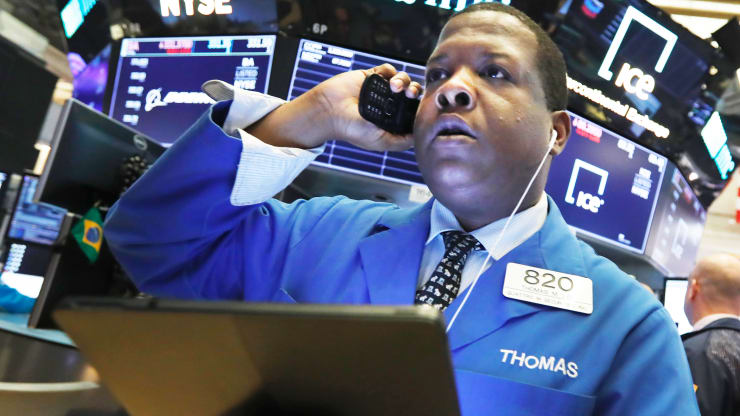
Stocks fell on Thursday as traders monitored the latest trade developments and assessed a whistleblower complaint against President Donald Trump that was released.
The Dow Jones Industrial Average traded 79.59 points, or 0.3%, lower at 26,891.12. The S&P 500 fell 0.2%, or 7.25 points, to 2,977.62, while the Nasdaq Composite pulled back 0.6% at 8,030.66. For the week, the S&P 500 was on pace for its second straight weekly drop.
Micron Technology, which is scheduled to release its latest quarterly figures after the bell, dropped 1.7%. Shares of large-cap tech companies such as Facebook, Amazon, Netflix and Alphabet all traded lower.
“It always amazes me how, despite everything else that is happening, the thing the market pays the most attention to is China trade,” said Art Hogan, chief market strategist at National Securities. “If you rank things in an algorithm, trade would be at the top.”
Stocks hit their session lows after Bloomberg News reported, citing a source, that the U.S. is unlikely to extend a temporary waiver that allows U.S. companies to sell supplies to Huawei, a Chinese telecommunications giant.
The market turned slightly higher after China’s foreign Minister Wang Yi said the U.S. has shown good will by waiving tariffs and China is willing to buy more American products, Reuters reported.
Both countries have engaged in a tit-for-tat tariff war since 2018. The back and forth between the world’s largest economies has sent shockwaves across global financial markets, increasing uncertainty around economic and earnings growth.
Wall Street ended Wednesday on a higher note after Trump said that a U.S.-China trade deal could arrive sooner-than-expected. Bloomberg News also reported China is expected to increase its U.S. soybeans purchases during trade talks next month.
Investors also grappled with uncertainty around Trump’s political future as pressure to impeach him grows.
The whistleblower said in the complaint that the president used his office to solicit interference from a foreign country ahead of the 2020 election. House Speaker Nancy Pelosi called the situation a “cover-up.”
This “is a reminder of the US political risks embedded in the outlook,” Joseph Lupton, senior global economist at J.P. Morgan, said in a note. “While the outcome is uncertain at this early stage and the likelihood of a Senate conviction is presently very low, the impeachment process could either amplify (or mute) other looming geopolitical risks.”
On Wednesday, the administration released a memo of a call between Trump and Volodymyr Zelensky, the Ukrainian president. The memo showed Trump asked Zelensky to “look into” Vice President Joe Biden’s son. However, it did not explicitly show a quid pro quo between the two leaders.
That came after the House launched a formal impeachment inquiry on Trump.
Tom Martin, senior portfolio manager at Globalt, does not think the impeachment proceedings are a market-moving issue. “The bigger issue is how does this impact Trump’s negotiating power with China.”
